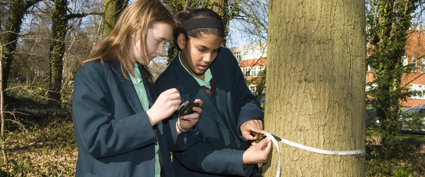
Presenting your fieldwork ideas to SLT
Getting fieldwork off the ground can be a huge challenge for teachers. Finding the right activity in the right place which will provide and test the right skills is a challenge in itself but teachers often find their efforts in this area are hindered by Senior Leadership Teams (SLTs) that cannot permit them to undertake fieldwork in the way they envisage. In some cases, SLTs outright refuse fieldwork taking place and teachers are left wondering how they will fulfil this essential part of the geography curriculum.
It is extremely rare that SLTs do not want fieldwork to happen and almost always these teachers are sympathetic to the geography department. However, one problem is that the cases against fieldwork are fairly sizeable. The cost of the trip itself, with staffing cover and transport often being the most expensive elements, means that SLT members are faced with the difficulty of having to decide if parents should bear the cost of the trip outright, risking the possibility that some parents, through financial hardship, may have to withdraw their children from the trip completely. The alternative is that the school itself funds the trip which, in times of existing budget constraints, is likely to mean that geography is competing for budget allocation with other departments wishing to also run fieldwork.
A further barrier can be finding the time within the school timetable to get students away from the school site as a cohort, especially if the trip is one that involves an overnight stay. With good reason, every department is likely to want all its students to be in all its lessons and, with added pressures of extracurricular commitments such as sports matches and performing arts events students, and their parents, may be torn in multiple directions, something the school SLT are likely to recognise.
So while it may feel like everything is stacked against geography fieldwork taking place, there are ways of presenting the idea of fieldwork to SLT which may make it easier for them to agree to your thoughts.
Remind them that geography is not academically complete without fieldwork
Non-geographers can see fieldwork as an extra or bonus activity to add onto the end of a topic or unit of work. This is not the case in geography where field skills and techniques are in the centre of the subject academically and are tested in public examinations. Geography is about a messy, real world and there is no better way of learning this than through face to face contact with it in real time.
Remind them that GCSE and A Level students have to undertake fieldwork
At the time of writing, there is a statutory requirement for students to undertake fieldwork at both GCSE and A Level – something which SLT themselves have to endorse in writing with the associated awarding bodies each year.
Discuss the wider benefits of fieldwork
As well as presenting the academic virtues of fieldwork, be sure to also highlight the wealth of soft skills that students learn by going out into the field, and working somewhat independently. As well as becoming better team players, students can demonstrate leadership skills, improve their communication skills, manage their time more effectively and become more confident in a whole range of other areas.
It may also be the case that some of these soft skills align with school-wide aims and objectives and links to these should be made explicit as the case for fieldwork is presented.
Be clear on the difference between a fieldtrip and fieldwork
Many departments undertake fieldtrips to museums and galleries and to non-geographers on SLT, they may easily see fieldwork as falling into the same bracket. Be clear to SLT that fieldwork is a far cry from simply a trip to a separate institution where learning will take place. Instead emphasise the skills that students develop while doing fieldwork and show how the day would be planned very much like a lesson, with objectives and assessment built into the structure of the day.
Present your ideas well in advance
It is not uncommon for school diaries to be filled with activities a year in advance, and in order to make sure there is also room for geography fieldwork, try to ear mark fieldwork time a full academic year before it is due to take place. Going to SLT early with ideas will show how much you and your department colleagues value this learning time and in some cases, being first in the door may mean that you get given priority in the school diary.
Be on top of the organisation
SLTs are not likely to agree to fieldwork if the details around learning objectives, safety measures and tasks and activities are woolly and difficult to pin down. Instead be bold in what you know students will achieve from fieldwork and be as organised as you can be prior to talking to SLT with regards to the logistics of the trip. If SLT can see a clear plan of action and how it will be executed, as well as what the learning outcomes will be they will be far more likely to work with you in making it happen. This means doing a recce and writing initial risk assessments as well as teaching notes in the style of a lesson plan, showing what exactly the students will be doing.
Develop a budget and cost-reduction plan
With the knowledge that financial costs will be the main barrier to SLT accepting your fieldwork proposal, be ready to discuss with them figures of accurate costs and how these might be mitigated. Develop your own strategies for off-setting the costs of the fieldwork, such as by borrowing minibuses from partner schools, joining forces with another department to create a joint trip or making your own fieldwork equipment. Think carefully about your cohort and what you feel would be a feasible cost to ask their parents to incur and whether this leaves an equally reasonable amount for the school to subsidise.
Think creatively about how you will staff the fieldwork
When you approach SLT be ready to make interesting suggestions about how the fieldwork can take place with the minimal amount of disruption to the staff timetable. Develop a like-for-like relationship with another department (such as biology) who would also need teachers to accompany their fieldwork and plan for reciprocation of cover duties if possible. There may be members of bursarial staff who would welcome the chance to have a day out of the office or the maintenance yard in order to help ease the staffing ratio during fieldwork. Equally there may be recent retirees from the school, or even better from the geography department, who would be willing to volunteer their time for one day, with plenty of opportunities for a catch up on school gossip and a free lunch.
It is also worth remembering that SLT themselves might like to go on a geography fieldtrip – inviting more senior members of the school also means that the need for a full day’s cover might be avoided as they are unlikely to teach a full timetable themselves. Once a member of SLT has been on the fieldtrip it means it may be easier in subsequent years to have fieldwork approved as they will see first hand what takes place and how the students benefit from the experience.
Be willing to compromise
It is worth approaching SLT with ideas for fieldwork far greater than the scope of what you hope to achieve with the knowledge that some compromise on your part will still allow you to provide meaningful and exciting fieldwork opportunities for your students. A willingness to compromise on your ideas may mean the difference between fieldwork happening or not. Sensible compromises would be to develop a plan of on-site fieldwork experiences alongside those off-site as well as fieldwork which can take place in familiar locations as well as those further afield. It may be necessary to extend working hours outside the normal time boundaries of the school day or take out one data collection task from a set of many in order to best fit the work with public transport timetables.
Make fieldwork a key element of your department action plan
With fieldwork making a strong appearance on your department action plan, be this through the amount of fieldwork or the chance to develop new forms of fieldwork, it can be difficult for your SLT to deny you the opportunity to explore these areas. It is also worth encouraging department members to have fieldwork appear in their individual appraisal targets. SLT will see how highly you and your colleagues value fieldwork and learning outside the classroom and this can only serve to strengthen your case for it taking place.
